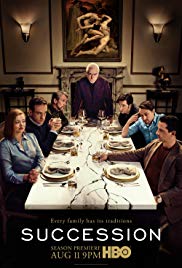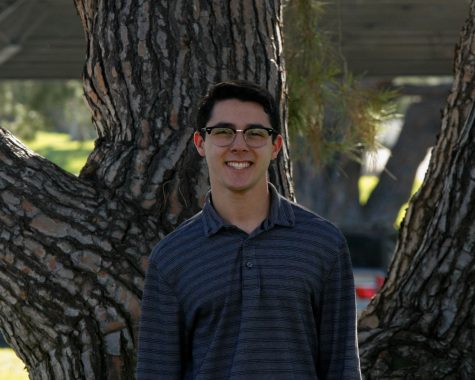Succession: a TV Show Review

Season 2 of Succession premiered on HBO on August 11th, 2019 (IMDb).
November 3, 2019

-Spoilers ahead-
As it wraps up its second season, Succession appears to have capitalized on a unique cultural moment, resonating with its zealous fans in a way that few shows can. It has set many corners of the media ablaze, drawing comparisons to other popular shows of the moment such as The Sopranos, Arrested Development, Lost, and Game of Thrones. Its opening theme alone has made waves, with rapper Pusha T adopting the soundtrack in his newly-released song “Puppets.”
On the surface, Succession has a very simple premise. Aging media mogul and Roy family patriarch Logan Roy (Brian Cox) undergoes sudden health issues. While trying to keep a firm grasp on his power as CEO of Waystar Royco (the company he founded), he begins to consider who he should name as his successor. Succession’s writers take this premise and expand on it, masterfully depicting the complex and often dark dynamics of the Roy family.
The main candidates for the CEO position are his children. His eldest son, Connor (Alan Ruck), is blissfully ignorant of events at Waystar Royco and is uninvolved in the company, but nevertheless reaps the rewards of his father’s plentiful financial resources. His second son, Kendall (Jeremy Strong), is heavily involved in the family business, eagerly trying to appease the father whose emotional abuse drove him to addiction. His third son, Roman (Keiran Culkin), is immature and sardonic, who is given more responsibility in the family company as the show progresses. His fourth child and only daughter, Siobhan (Sarah Snook), also known as “Shiv,” starts off the series maintaining her distance from the company, working instead as a political operative.
This show has many strengths, such as the multitude of layers it has to the story. One of these layers is the dynamic between members of the Roy family. What lies at the heart of Succession is the psychological abuse and ensuing trauma that Logan has instigated in his emotionally turbulent children. He has made himself omnipresent in his children’s lives, who rely on him not just for financial benefits, but for the emotional validation and love that he has never given. He treats his children like pawns, bullying them and tearing them down if they displease him or exhibit behavior that he interprets as disloyal.
This first layer of the show influences the second layer: how members of the family behave toward others. The emotional trauma the Roy children have endured from their father influences their behavior and personalities on a daily basis, usually for the worse. Connor is entitled, spending the family money without restraint and treating those “below” him with utter disregard. At a Waystar Royco company dinner in Season 1, Connor viciously yelled at the waitstaff because the utensil placement was incorrect and the butter was too cold. Kendall – arguably the most “redeemable” member of the family – is nevertheless emotionally detached from his ex-wife and children. He also broke up with a girlfriend of his for saying “awesome” too many times. Roman is petulant and sarcastic, who uses insults as his emotional shield. Lastly, Shiv is distant and self-absorbed, who cheated on her then-fiancee/now-husband, Tom (Matthew Macfadyen), and then asked him for an open marriage on their wedding night. Lacking a morally upright example in their lives, the Roy children disregard and mistreat others to compensate for the emotional trauma that burdens them within.
The Roys are loosely based off of other families in control of media conglomerates – such as the Murdochs and the Redstones – that put profit over a higher purpose. Succession explores not only the harm that the Roys inflict upon each other, but also to the world around them. We are reminded of this in episode 8 of season 2, in which Logan’s estranged brother Ewan (James Cromwell) says: “He’s morally bankrupt…In terms of the lives that will be lost by his [support for] the climate change deniers, there’s a very persuasive argument to be made that he’s worse than Hitler.” While comparing Logan to a homicidal dictator may be a false equivalency, the crux of Ewan’s point remains true: the Roy family is not only horrible to each other, but they also pursue their own personal and financial gain at the expense of the greater good.
There is no better example of this than the scandals in Waystar Royco’s cruises division, a story-line that took a backseat in Season 1 but came to the forefront towards the second half of Season 2. The company’s cruise ship division covered up sexual assaults and murders over several years (with Logan Roy’s knowledge and permission), leaving a paper trail in its wake. What started off as a thorn in the company’s side turned into a full-blown crisis, with the story making headlines, instigating Congressional hearings, and leaving shareholders wanting someone held responsible.
In the Season 2 finale, this left the Roy family on board a massive yacht, with Logan coaxing the family into choosing a “skull to wave” to shareholders. This led into one of the most tense yet illustrative scenes of the season, with members of the family and senior company officials sitting around a table, discussing who among them should be sold out as the one chiefly responsible for the cover-ups. Never mind that Tom (former head of cruises) was actually guilty, having directed his assistant and Logan’s great-nephew, Greg (Nicholas Braun), to destroy the evidence. Rather, as is so often the case with Succession characters, the conversation was led solely by the urge for self-preservation, morals be damned.
Central to Succession is the silliness of extreme wealth- indescribably plentiful wealth. The New York City high-rises, countless estates, helicopters, and designer clothes (along with a cadre of servants) are all among the possessions of the ultra-wealthy. However, if you look past the ostentatious display of wealth, you will find absurdity. Like so many other forms of entertainment, Succession explores a uniquely American fascination: the lives of the ultra-wealthy. However, this show suggests that maybe exorbitant wealth isn’t such an asset after all, depicting the lives of its characters not simply as ones of great glamour and luxury, but often as downright miserable. This ridiculous level of accumulation has made the Roys into spoiled, emotionally troubled children with more toys than they know what to do with.
To me, Succession is about two topics: accumulation and corrosion. More specifically, the characters’ accumulation of wealth and power, and the corrosion of their principles and motivation. The Roy children are competing for the position of CEO, but to what end? What could this position possibly bring them other than a salary they do not need, shallow ego-boosting, and temporary validation from an emotionally hollow father?
In Season 2, the show explored the ideas of accumulation and corrosion in relation to Shiv, Logan’s daughter who distanced herself from the family as a political operative. She started off the season separated from the inner workings of her family, which was advantageous for her career. However, her desire to accumulate power and become head of the company corroded her independence and professional distance from the rest of the family. By the end of Season 2, she was just as embroiled in the schemes and scandals of Waystar Royco as any other senior company official.
The internal corrosion resulting from the petty search for accumulation reminds viewers of an important question: what is the purpose of accumulation if it only serves to benefit oneself?




